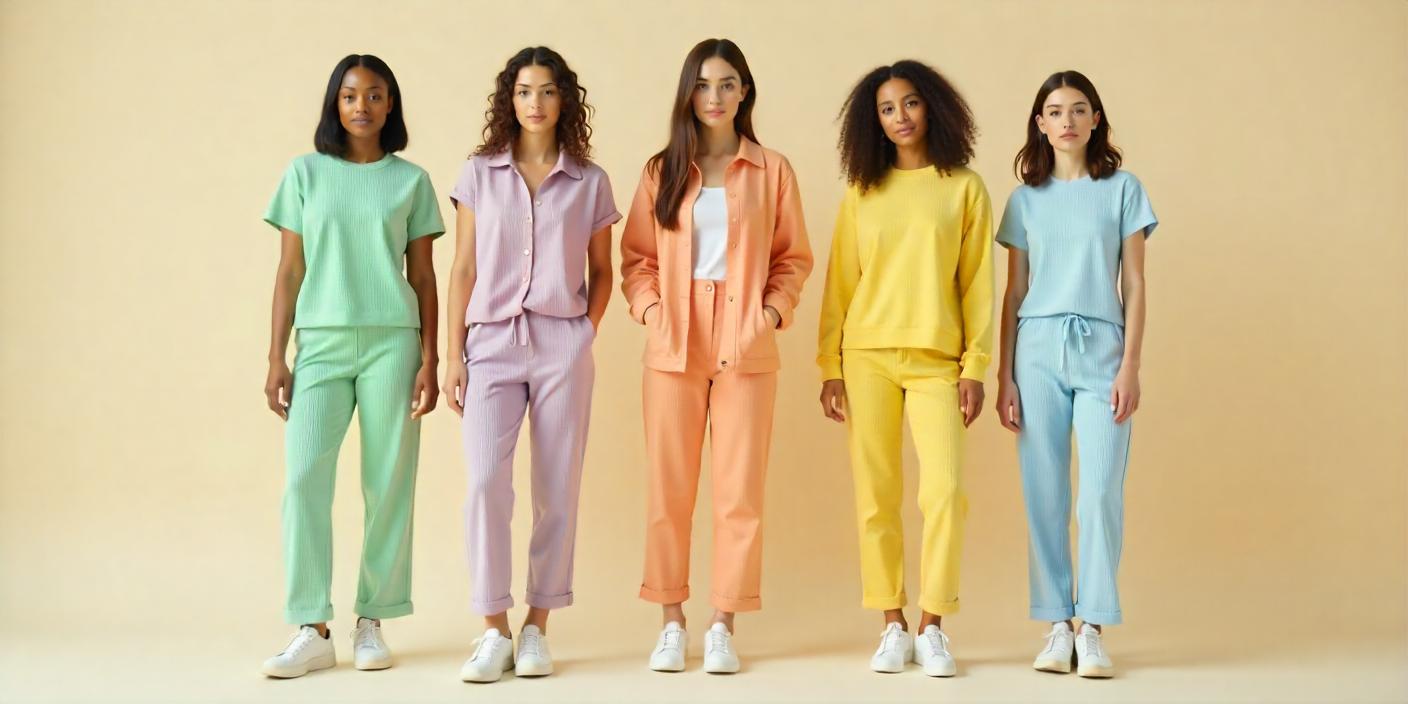The fashion landscape in the United Kingdom is experiencing a profound transformation as sustainable clothing UK brands gain momentum and reshape consumer expectations. What began as a niche movement has evolved into a significant market force that’s challenging conventional fashion’s environmental and social impacts while proving that style and sustainability can coexist harmoniously.
The Evolution of UK Fashion: From Fast to Thoughtful
For decades, the UK fashion industry was dominated by the “fast fashion” model— characterized by rapid production cycles, trend-driven designs, and low prices made possible through offshore manufacturing and cost-cutting measures. This approach created a culture of disposability, with the average British consumer purchasing approximately 26 new garments annually and discarding nearly 70% of their wardrobe.
However, a significant shift is underway. Research from the Fashion Retail Academy reveals that 51% of UK shoppers now prefer to buy clothing that will last for years rather than following seasonal trends, while 33% actively seek out sustainable and eco-friendly clothing UK options. This changing mindset is driving a transformation across the entire industry.
The Environmental Imperative Behind Sustainable Fashion
The conventional fashion industry’s environmental footprint is staggering:
- Fashion production contributes approximately 10% of global carbon emissions
- It’s the second-largest consumer of water worldwide
- 85% of textiles end up in landfills or incinerated
- Washing synthetic garments releases about 500,000 tons of microfibers into oceans annually
- The industry uses over 15,000 different chemicals in production processes
These sobering statistics have created an urgent need for alternative approaches that reduce environmental harm while meeting consumer demand for stylish, quality clothing.
How Sustainable Clothing UK Brands Are Leading
Change
British sustainable fashion brands are pioneering innovative approaches across multiple dimensions:
Material Revolution
The foundation of sustainable fashion begins with responsible material choices:
- Organic natural fibers: UK brands are championing GOTS-certified organic cotton, which eliminates harmful pesticides and reduces water usage by up to 91% compared to conventional cotton.
- Recycled materials: Innovative companies are transforming post-consumer plastic bottles, fishing nets, and textile waste into high-performance fabrics.
- Regenerative agriculture: Forward-thinking brands are investing in farming practices that actually improve soil health and sequester carbon.
- Novel sustainable materials: UK research institutions and startups are developing exciting alternatives like pineapple leaf fiber, mushroom leather, and seaweed textiles.
Production Innovation
Beyond materials, sustainable UK fashion brands are revolutionizing how clothing is made:
- Local manufacturing: The revival of British garment production reduces transportation emissions while creating local jobs and ensuring ethical working conditions.
- Zero-waste pattern cutting: Innovative design approaches eliminate the approximately 15% of fabric typically wasted during conventional manufacturing.
- Renewable energy: Leading sustainable factories operate using wind, solar, and other renewable energy sources.
- Water conservation: Closed-loop water systems and waterless dyeing technologies dramatically reduce one of fashion’s most resource-intensive aspects.
Business Model Transformation
Perhaps most revolutionary is how sustainable fashion brands UK are reimagining the fundamental business of fashion:
- Circular design: Products created for longevity, repair, and eventual recycling or biodegradation.
- Made-to-order production: Eliminating overproduction by creating garments only when purchased.
- Rental and subscription services: Offering alternatives to ownership that maximize garment utilization.
- Repair and take-back programs: Extending product lifespans and ensuring responsible end-of-life management.
The Consumer Shift: Changing Expectations and Behaviors
The growth of sustainable fashion in the UK is largely consumer-driven, with several key factors accelerating adoption:
Increased Environmental Awareness
Climate change coverage, documentaries highlighting fashion’s environmental impact, and growing concern about plastic pollution have educated UK consumers about the consequences of their clothing choices. This awareness has translated into changing shopping behaviors, with many actively seeking out sustainable alternatives.
A 2023 survey found that 67% of UK consumers consider sustainability factors when purchasing clothing, with this figure rising to 73% among millennials and Gen Z. This represents a significant shift from just five years earlier, when only 23% of consumers reported considering sustainability in their fashion choices.
Quality Renaissance
After years of declining quality in mass-market fashion, UK consumers are rediscovering the value of well-made garments:
- 62% of UK shoppers now say they’re willing to pay more for clothing that will last longer
- The average expected lifespan for a garment has increased from 2.2 years in 2018 to 3.8 years in 2023
- Repair services have seen a 43% increase in demand over the past three years
This quality renaissance aligns perfectly with sustainable fashion’s emphasis on durability and timeless design.
Transparency Demands
Today’s consumers expect unprecedented transparency from fashion brands:
- 78% of UK shoppers want information about where their clothes are made
- 65% are interested in the environmental impact of their purchases
- 59% want to know about the working conditions of garment workers
Sustainable clothing UK brands are meeting these demands through detailed supply chain information, impact metrics, and behind-the-scenes content that builds trust and loyalty.
The Economic Impact: Sustainable Fashion as Business Innovation
Contrary to early perceptions that sustainability and profitability were mutually exclusive, the UK’s sustainable fashion sector is demonstrating impressive economic vitality:
- The UK ethical fashion market was valued at £3.2 billion in 2023, growing at 8.9% annually
- Sustainable fashion startups attracted over £150 million in investment in 2023 alone
- Established brands that have implemented comprehensive sustainability initiatives report 23% higher customer loyalty and 18% higher average order values
This economic success is creating a virtuous cycle, with more investment flowing into sustainable innovation and more conventional brands adopting responsible practices to remain competitive.
Challenges and Opportunities in the Sustainable Fashion Landscape
Despite significant progress, several challenges remain in the UK sustainable fashion ecosystem:
Price Accessibility
While the price gap between conventional and sustainable fashion is narrowing, eco-friendly clothing UK options often carry higher price tags that reflect the true cost of responsible production. This creates accessibility challenges for budget-conscious consumers.
Innovative approaches addressing this challenge include: – Rental and subscription services that make high-quality sustainable fashion more accessible – Secondhand marketplaces specializing in pre-loved sustainable brands – Transparent pricing models that educate consumers about value over time – Modular designs that can be styled multiple ways, reducing cost-per-wear
Scale and Efficiency
Many sustainable practices currently operate at smaller scales with higher production costs. As demand grows, the industry is working to develop more efficient processes that maintain sustainability while improving affordability.
Consumer Education
While awareness is growing, many consumers still lack understanding of what makes clothing truly sustainable and how to identify greenwashing—misleading environmental claims without substantive practices to back them up.
The Future of Sustainable Clothing UK: Trends to Watch
Looking ahead, several developments promise to further accelerate the UK’s sustainable fashion movement:
Technology Integration
Emerging technologies are enhancing sustainability across the fashion ecosystem:
- Blockchain for transparent supply chain verification
- AI-powered design tools that minimize waste
- Digital product passports tracking environmental impact
- Virtual try-on reducing returns and associated emissions
- Bioengineered materials with reduced environmental footprints
Policy and Regulation
The UK government is considering various measures to address fashion’s environmental impact:
- Extended producer responsibility requiring brands to manage end-of-life for their products
- Mandatory sustainability reporting and due diligence
- Tax incentives for circular business models
- Restrictions on hazardous chemicals and materials
- Support for domestic textile recycling infrastructure
These policy developments would create a more level playing field and accelerate industry-wide improvements.
Mainstream Integration
Perhaps most significantly, the line between “sustainable fashion” and “fashion” is beginning to blur, with sustainability becoming an expected aspect of quality rather than a separate category. Major high street retailers are incorporating organic materials, recycled content, and transparent supply chains, while luxury brands are emphasizing craftsmanship, longevity, and responsible sourcing.
The rise of sustainable clothing UK represents a significant and promising shift in how we produce, consume, and value fashion. As British consumers increasingly prioritize environmental and social responsibility alongside style and quality, the fashion industry is being compelled to address its impacts in meaningful ways.
This evolution toward more conscious consumption isn’t just changing what we wear— it’s redefining our relationship with material goods and challenging the notion that constant novelty is necessary for satisfaction. By embracing sustainable style, UK consumers are not only reducing their environmental footprint but also supporting a more ethical, innovative, and responsible fashion ecosystem.
The journey toward truly sustainable fashion is ongoing, with challenges still to overcome. However, the momentum behind eco-friendly clothing UK suggests that this is not merely a passing trend but a fundamental reimagining of how fashion can function in harmony with both people and planet—a transformation that positions the UK at the forefront of a global shift toward more responsible and thoughtful consumption.





